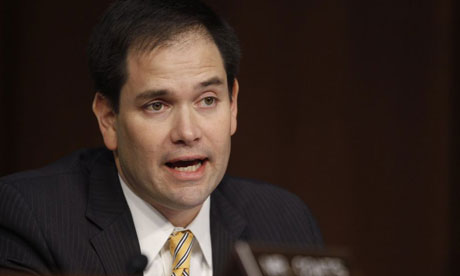Senators plan to unveil bill as early as next week but conservatives are wary of citizenship for undocumented migrants
guardian.co.uk, Monday 1 April 2013

The Obama administration said on Monday that it was encouraged by signs of progress towards a comprehensive package of immigration reforms that would extend a route to citizenship to the country’s 11 million undocumented migrants.
As cross-party negotiations enter their crucial final stages ahead of the unveiling of an immigration bill in the US Senate as early as next week, the White House is pressing senior congressional leaders to forge ahead with a robust bill that would provide a clear pathway to citizenship. President Obama’s spokesman said that “we are encouraged by the continuing signs of progress”, though he refused to be drawn on the details of the package that are still being thrashed out.
The most politically charged aspect of the draft bill is likely to be the precise terms of a pathway to citizenship for the 11 million. One of Obama’s core principles contained in his blueprint for immigration reform was that undocumented immigrants should be granted a real chance of becoming full US citizens.
But this is seen as a red rag to many Republicans, who interpret it as a form of amnesty that rewards illegal behaviour. Advocates of the reform, including the four Republican and four Democratic senators who make up the bipartisan – dubbed the “gang of eight” – who are framing the legislation, are all too aware that conservative anxieties have to be assuaged if the bill is to have any chance of achieving congressional approval.
That sensitivity helps explain the wobble over the weekend shown by Marco Rubio, the Tea Party-backed senator from Florida and a possible Republican hopeful in 2016. He took a markedly less upbeat position than his fellow members of the Senate group, stressing that the final terms of the bill had yet to be agreed and that it should not be rushed.
Rubio’s ambiguous stance, carefully pitched to address the scepticism of many Republicans while keeping one foot in the reformist camp, was applauded by leading conservatives on Monday. Jeff Sessions, a senior member of the senate judiciary committee from Alabama, said Rubio had underlined that “never again can Congress pass a far-reaching proposal only for the American people to find out what’s in it later. What we need, and must have, is a full and thorough national discussion over every component of this bill.”
Carney said that White House staffers were engaged with the group of eight senators over drafting the legislation and denied that Obama was keeping in the background to avoid giving Republican opponents of the bill a target. But he refused to answer questions about how difficult the president was willing to make the pathway to citizenship in order to overcome conservative resistance to reform.
Details of the proposals that have been floated in the media include a possible minimum wait time for citizenship for any currently undocumented immigrant that could extend to as long as 13 years. Though individuals would be allowed to “come out of the shadows” relatively quickly and easily, by registering for a work permit, the prolonged delay in processing their claims for full citizenship, combined with possibly steep fines for the illegality of their previous status, could dissuade many from even embarking down the citizenship road.
Groups campaigning for a comprehensive deal that will extend to most if not all of the 11 million undocumented individuals are fearful that if that too many concessions are granted to the Republicans in these last few days of negotiations, then the resulting bill will fail to repair the current broken immigration system. Fred Tsao, policy director of the Illinois Coalition for Immigrant and Refugee Rights, said that many people had already been in the US for many years.
“We hope that there will be a path to citizenship that will be welcoming for the vast majority of individuals who need it. If the gang of eight don’t craft something that is accessible, then a substantial number of people won’t be eligible and they’ll continue to be vulnerable to family separation and exploitation, and is that what we really want in America today?”


